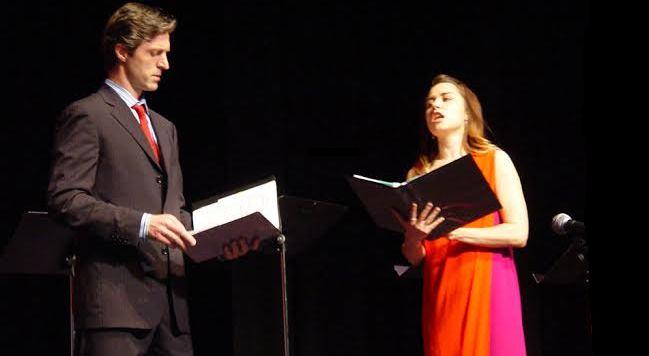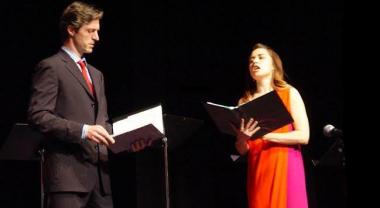
Scooping the UK’s Glyndebourne Festival, which revives Poliuto on May 21, West Edge Opera completed its two-performance concert version run of Donizetti’s 1838 tragic opera on April 1. Holding forth in Berkeley’s Freight & Salvage, whose comfortable seats, clear acoustic, and excellent sight lines served the performance well, the peripatetic little company again confirmed that its “Opera Medium Rare” series of seldom-performed operas is one of the finest and most vital operatic treats in town.
The rarity of Poliuto performances is no doubt due to three factors: contemporary indifference to its plot, which superimposes the familiar operatic tale of a woman’s conflicted love for men of opposing forces onto the martyrdom of Armenian Christians by the Romans in 257 CE; the absence of hummable tunes that haunt the memory; and the virtually superhuman demands of its vocal score. It’s one of those operas where bel canto and can belto demand equal billing. Not even soprano Maria Callas, for whom La Scala famously revived the opera in 1960, was able to negotiate the tortuous coloratura of noblewoman Paolina’s opening scenes without fragmenting Donizetti’s perilous lines to ill effect. Which is not to say that Poliuto’s powerful string of arias and ensembles is misjudged: The score, including a demanding sextet with chorus that requires everyone to sing full out with impeccable intonation, is marvelous, deserving a revival.
Thankfully, soprano Elizabeth Zharoff, fresh from rave reviews as Violetta in English National Opera’s La Traviata, was in excellent voice as Paolina. Although her attacks were frequently dry, her voice opened to display a surfeit of exciting, knock-your-socks-off color and power in the upper middle and top of the range. Even if her instrument’s lack of a cavernous bottom and dramatic weight rendered it less than ideally suited to the part, her performance was a triumph. Soprano Elizabeth Zharoff, fresh from rave reviews as Violetta in English National Opera’s La Traviata, was in excellent voice … [displaying] a surfeit of exciting, knock-your-socks-off color and power in the upper middle and top of the range.
In the lead role of her husband, Christian convert Poliuto, tenor Michael Desnoyers shared a beautifully produced, even voice whose palpable sincerity and flawless legato seemed ideally suited to Mozart. Although ultimately too buttoned up, Clark Kent-like, for a heroic role that requires an artist to rip through the music with Superman-proportioned projection and gut-wrenching tone, Desnoyers acquitted himself admirably.
Well-matched in volume and beauty of tone, handsome baritone Anders Froehlich did a superb job as Paolina’s other love interest, Roman general Severo. Blessed with an attractive voice that retains strength and color throughout the range, Froehlich made Paolina’s ultimate stand-by-her-man sacrifice even more telling.
Tenor Michael Jankosky made a finely sung contribution as Poliuto’s friend and fellow Christian, Nearco. Bass John Bischoff may lack the very top extension Donizetti demands from Armenian High Priest Callistene, but his handsome voice, conviction, and marvelous low extension made his performance a pleasure. In smaller roles, Sigmund Seigel and John Minagro acquitted themselves admirably, but Jake Scheps’ voice virtually hid behind his voluminous hair. If the women of the chorus weren’t always together, they still made La Scala’s chorus in the opening scenes sound shabby by comparison. (I’m not exaggerating.)
There was most definitely a Superman in this production, and his name is Jonathan Khuner. Not only did West Edge Opera’s longtime musical director play piano and inspire beautiful sounds and apt tempi from his ensemble (Sara Usher, violin; Nancy Bien, cello; and Nora Adachi, clarinet), but he also assembled a cast of which any company, small or large, would be justifiably proud.

